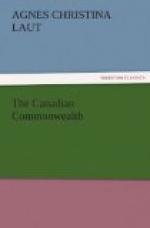If you take a look at the map of Quebec under its new boundaries up into Labrador—it seems absurd to call a region three times the area of Germany “a province”—you will see that only the fringe of the river fronts has been peopled. This is owing to the old system of parceling out the land in mile strips back from the river—a system that antedated the railroads, when every man’s train was a paddle and the waterfront. Beyond, back up from the rivers, lies literally a no-man’s-land of furs plentiful as of old, of timber of which only the edge has been slashed, of water power unestimated and of mineral resources only guessed. It seems incredible at this late date that you can count on one hand the number of men who have ascended the rivers of Quebec and descended the rivers of Labrador to Hudson Bay. The forest area is estimated at one hundred and twenty million acres; but that is only a guess. The area of pulp wood is boundless.
Along the St. Lawrence, south of the St. Lawrence and around the great cities come touches of the modern—elaborate stock farms, great factories, magnificent orchards, huge sawmills. The progress of Montreal and the City of Quebec is so intimately involved with the navigation of the St. Lawrence route and the development of railroads that it must be dealt with separately; but it may be said here that nearly all the old seigneurial tenures—Crown grants of estates to the nobility of New France—have passed to alien hands. The system itself, the last relic of feudal tenure in Canada, was abolished by Canadian law. What, then, is the aim of Quebec as a factor in Canada’s destiny? It may be said perfectly frankly that with the exception of such enlightened men as Laurier, Quebec does not concern herself with Canada’s destiny. In a war with France, yes, she would give of her sons and her blood; in a war against France, not so sure. “Why are you loyal?” I asked a splendid scholarly churchman of the old regime—a man whose works have been quoted by Parkman. “Because,” he answered slowly, “because—you—English—leave us—alone to work out our hopes.” “What are those hopes?” I asked. He waved his hand toward the window—church spires and yet more spires far as we could see down the St. Lawrence—another New France conserving the religious ideals that had been crushed by the republicanism of the old land. Let it be stated without a shadow of doubt—Quebec never has had and never will have the faintest idea of secession. Her religious freedom is too well guaranteed under the present regime for her to risk change under an untried order of independence or annexation. The church wants Quebec exactly as she is—to work out her destiny of a new and regenerate France on the banks of the St. Lawrence.




